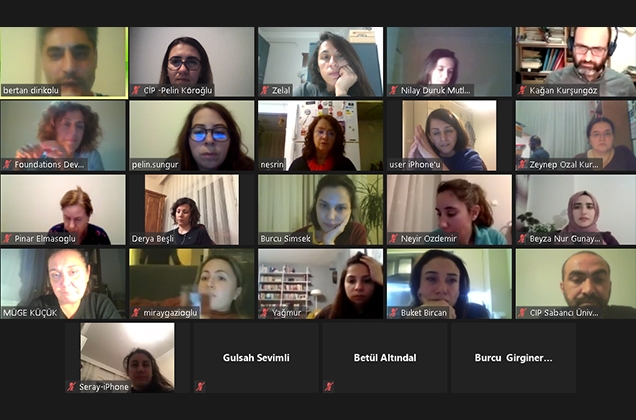19/06/2021
Sabancı University CIP organizes new projects for university staff virtually during the pandemic.

Some examples of the online projects that the university staff members volunteered in are given below:
Compost Training was delivered by Ayşe Betül Çelik Kıbrıs, member of Sabancı University Faculty of Arts and Social Sciences and a permaculture designer, and Barış Kıbrıs, a permaculture designer.
The training highlighted the degree of exploitation of natural resources, which became a major source of pollution threating the lives of all living things, including human beings. The trainers said the current situation was an extreme one. They added that it was possible for us to assume responsibility for our own waste, which we could turn into compost, and contribute to the sustainability of life by generating soil instead of pollution. The training focused on what soil and compost were and how important they were for life, in addition to explaining methods for making compost and using the final product.
Audio Books for the Visually Disabled Project was a project organized to help the visually disabled access books. The volunteers participating in the project made their reading in collaboration with Boğaziçi University Technology and Training Center for Individuals with Visual Disabilities (GETEM). The volunteers, who were Sabancı University staff members, selected from among the books requested by GETEM members and had their readings recorded.
We Knit For Children Project was a project in which Sabancı University staff members knitted scarves and caps with Sibel Kavaklıoğlu, a knitting trainer.
The names and details of the projects to be implemented in Spring are as follows:
- Audio book reading for the visually disabled project
- Sign language learning for staff members project
- We knit for children project
- Environmental awareness permaculture training (10 hours)
Audio Book Reading For The Visually Disabled Project
As was the case in the Audio Book project, Sabancı University staff members will read a book they select from the list of books chosen according to the needs of visually disabled individuals for voice recording applications. The audio books will be recorded and offered to the visually disabled via Boğaziçi University GETEM.
Before starting to read books, staff members will receive a 2-day training for 3 hours on Zoom about “reading, voice and breath techniques”. After the training, there will be demo readings to be sent to GETEM. Following GETEM’s approval, volunteers will select a book from GETEM database and proceed with the reading and recording process.
Sign Language Learning
Sign Language Training will be carried out for 1 day a week for 1 hour. The training will be delivered by Serkan Ural, sign language trainer. The training will last 6 weeks. When the dates and hours of training are definite, a Zoom link will be shared by CIP.
Volunteers to participate in Sign Language Training will be able to
● have information and gain awareness about visual impairment, deafness and Turkish sign language,
● learn Turkish sign language alphabet,
● learn simple introduction signs,
● learn words through letter games.
We Knit for Children Project
We knit scarves, caps and gloves for children in need
This project will be open to all Sabancı University students, staff members and their families. The meetings will be online 1 day a week and each meeting will last 1 hour. The scarves, caps and gloves knitted will be sent to children in need and to village schools in places with harsh winter conditions in November 2021. CIP determines disadvantaged village schools itself through its own research.
Training sessions will be online on Thursdays from 20.30 to 21.30 and delivered by Sibel Kavaklıoğlu.
With this project, CIP wants to underline that there must be no gender discrimination with regards to knitting, as is the case with cooking, washing clothes, washing dishes, ironing, and cleaning!
Environmental Awareness Permaculture Training (10 hours)
Designing a Restorative Life through the Basics of Permaculture
What can an individual change? We will not say environmental problems are too big, and volunteers are too few. We will take an action and seek answers to the following questions:
● How can we build a restorative life considering the earth and humans?
● How can we enrich the environment and life on the basis of self-sufficiency?
● How can we grow our food by producing without consuming; how can we establish crisis-resilient, sustainable systems?
Permaculture is a science of design that aims to generate sustainable systems intended to feed and restore nature instead of harming it, while meeting human needs for the purpose of establishing a more nature-friendly and healthier life. The training will focus on the ethics and principles of permaculture, and is composed of sessions spread over 5 days, each lasting 2 hours.
Permaculture training will be delivered by a team called Orman6, which aims to reach everyone who wants to grasp the essentials of permaculture and restorative life. The team members are Evren Yıldırım, Burcu Arıkan and Buket Atlı, who were trained by trainers of the Turkish Permaculture Research Institute in 2017.
To apply, you can fill in the application form.




